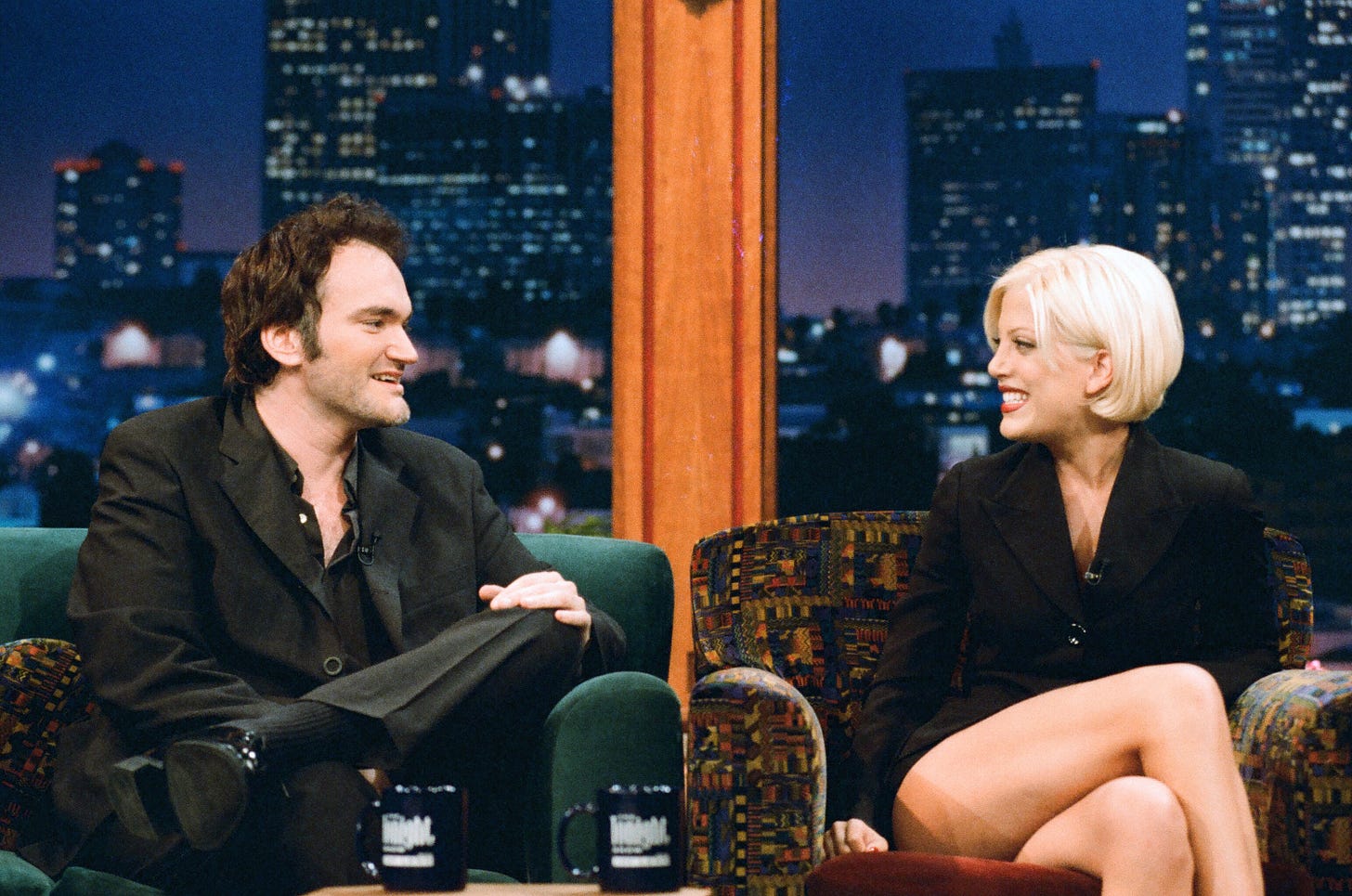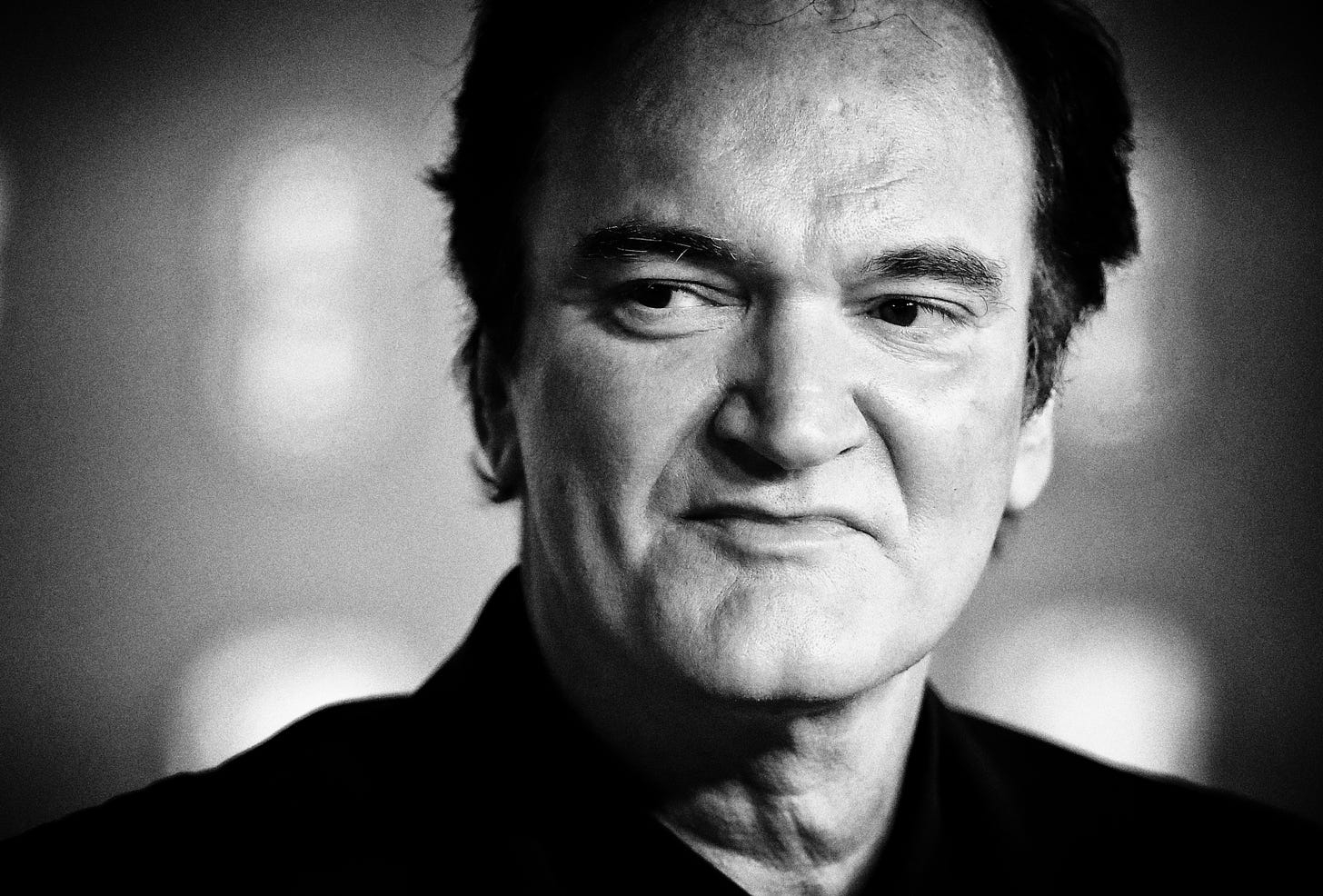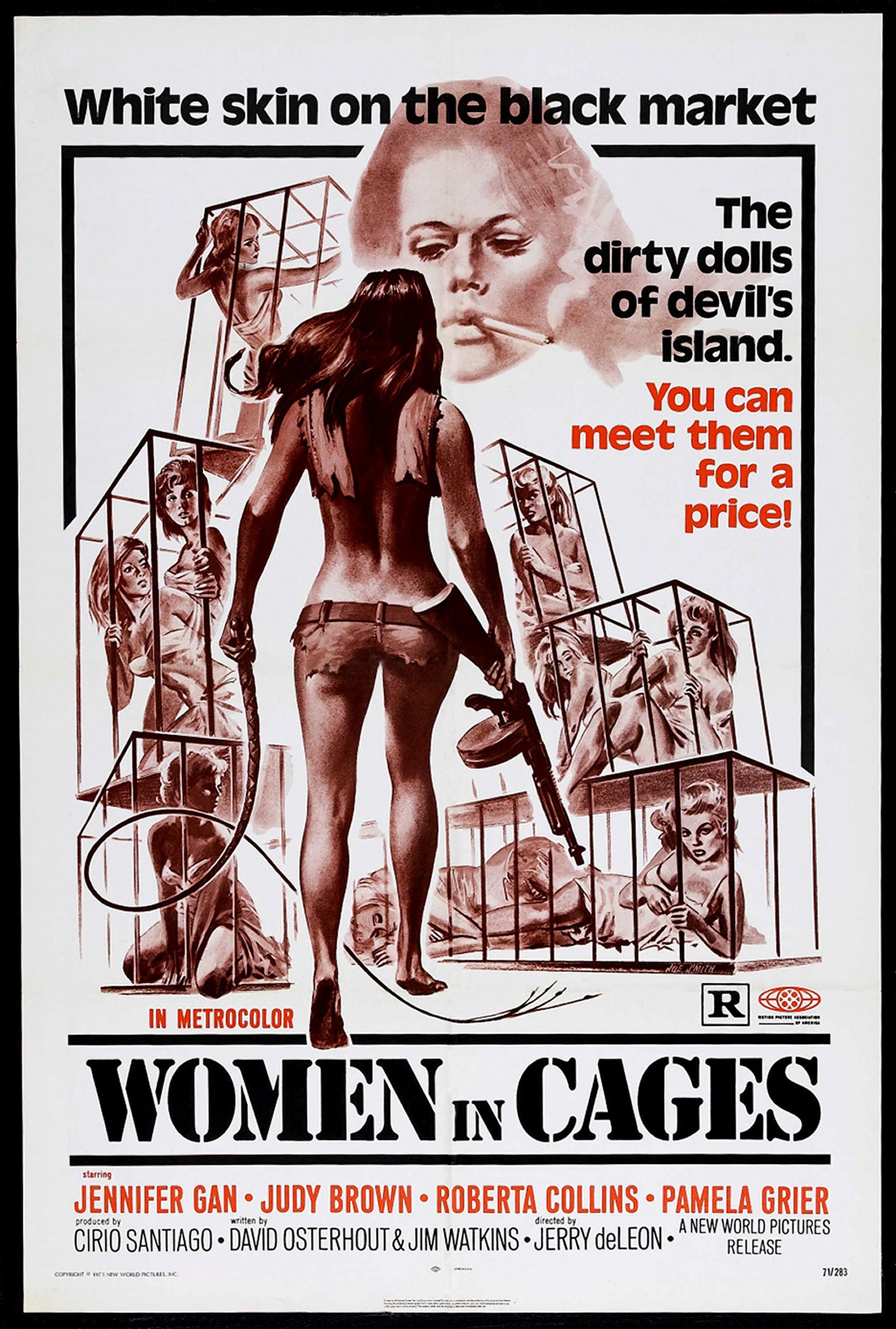Quentin Tarantino Comes Full Circle
A new podcast returns clerks-turned-filmmaker Tarantino and Roger Avary to their video store roots.
Quentin Tarantino can explain in exacting detail why he appreciates Gerardo de León’s Women in Cages. It’s not just that the 1971 film, part of the era’s wave of women-in-prison films, provided a plum early role for Tarantino’s future Jackie Brown star Pam Grier. It’s the unique way Women in Cages combines elements from producer Roger Corman’s New World Pictures with the films of Filipino director de León, who was making his sole venture into the American film industry. True, Tarantino prefers The Big Doll House, the other Corman-produced women-in-prison film Grier made during that trip to the Philippines (it’s “frankly, much better”), but he argues that the tensions of a veteran of the Filipino film industry working in an American idiom created singular qualities that make Women in Cages uniquely compelling.
Tarantino discusses the film on a bonus episode of Video Archives, a recently debuted podcast he co-hosts with fellow filmmaker Roger Avary, with whom he shares a Best Original Screenplay Oscar for Pulp Fiction. The show’s named for the now-legendary Manhattan Beach video store where the two worked and struck up a friendship back in the ’80s. But the connection runs deeper. When Video Archives closed, Tarantino purchased its videotape inventory, including the shelves. (Avary owns the laserdisc stock, much of which, he notes, has degraded.) The podcast, in which Tarantino and Avary watch (on VHS) and discuss movies from the once-mighty store’s expansive collection, is recorded in a kind of reconstruction of their old workplace.
The Reveal is a reader-supported newsletter dedicated to bringing you great essays, reviews and conversation about movies (and a little TV). While both free and paid subscriptions are available, please consider a paid subscription to support our long-term sustainability.
In the first episode, the pair cover a double feature of John Carpenter’s Dark Star and Ulli Lommel’s Cocaine Cowboys, a 1979 drug thriller best known for featuring an appearance by Andy Warhol. The two get into the behind-the-scenes and after-the-fact minutiae of both films, from reviews (Tarantino comes prepared with extensive quotes) to the quality of the VHS transfers to Cocaine Cowboys star Tom Sullivan’s double life as a drug dealer to the rich and famous. Avary’s daughter Gala Avary, whose casual expertise suggests film enthusiasm can be passed genetically, serves as announcer and occasional guest.
For some, say those who could care less about what other films were distributed by the company that released the tapes watched for the episode, it will be too much. For those of us whose blossoming cinephilia coincided with Tarantino’s ‘90s ascent, it’s a bit like hearing a favorite musical artist from days prove they can still offer a fresh takes on their greatest hits. It’s hard to understate Tarantino’s impact on a generation of budding film lovers in the time between Reservoir Dogs’ Sundance premiere in 1992 and the release of Jackie Brown in 1997, and not just because of the movies he made during that time (and those adapted by others from his screenplays, and the unmistakable script doctoring work he did on others’ projects, and the acting appearances he made in everything from Destiny Turns on the Radio to Margaret Cho’s sitcom All-American Girl). Each new project initiated a new cycle of interviews in which Tarantino would recount his origin story as a film nut-turned-video store clerk-turned director, a story that would inevitably include one aside after another about the movies he loved (and some he hated).
For those who admired his work, these interviews (and the films his own movies referenced) doubled as a kind of syllabus. In time, I’m sure I would have sought out, say, The Killing, Blow Out, City on Fire, or Chungking Express (released in the U.S. under Tarantino’s short-lived Rolling Thunder shingle), but Tarantino provided a short cut, like Kurt Cobain when he’d shout out The Raincoats and the Meat Puppets as influences. A filmmaker named Mike White (not that one) put out a pair of short docs in the ‘90s designed to point out that Tarantino borrowed freely from the works of others, but Tarantino was happy to give the game away every time he opened his mouth, giving credit where it was due.
Tarantino hardly disappeared after that first wave of fame but, perhaps unavoidably, the interviews started to shift to the subject of his own life and work rather than the obsessions of a recently made-good wunderkind who, not long before, was recommending movies to Video Archives customers. In some ways, the podcast brings him full circle, as if the filmmaking career has ultimately been a kind of means to an end, a way to get back to days spent doing nothing but seeking out, geeking out, and spouting off about movies. Whether intended to or not, Video Archives sometimes sounds like a return to innocence for both Tarantino and Avary (whose troubles are well documented), a retreat to a kind videotape-strewn Garden of Eden.

Listening, it sometimes feels as if no time has passed since the days when Tarantino would regale interviewers with tales of using Rio Bravo as a kind of litmus test for prospective girlfriends. But time has passed (and let’s fully acknowledge how weird it is this that quirks like that once seemed charming). As a filmmaker, Tarantino has gone past appreciation to interrogate the dark allure of cinematic sex and violence. But as a fan, he’ll casually mention, say, rape gangs as a Women in Cages plot element without feeling the need to go any deeper. He’s here to gush, not problematize. And, as invaluable a beacon as Tarantino has been to multiple generations of film fans, we’ve also discovered that his beacon’s light concentrates heavily on the cool genre films of a particular era (which happens to coincide with Tarantino’s youth) while leaving a lot of corners in the dark.
Tarantino used to be one of the loudest voices shaping the way I looked at film (and, undoubtedly, for a time in college through my own stint behind the counter of a video store the loudest voice). Now, he’s become one of many. Twenty-five years ago, hearing him gush about the 1987 Michael J. Fox comedy The Secret of My Success on an episode of The Ringer podcast The Big Picture might have led me to give it another look. Today, nah, I’m good. There are a lot of other movies I need to see. But his is still a welcome voice, one whose infectious enthusiasm makes me want to fill any stray hours with the kind of non-required movie-watching I don’t always find as much time for as I should. The video stores might have gone away and the clerks disappeared with them, but their spirit lives on, both on Tarantino and Avary’s podcast and every time anyone utters the phrase, “Have you seen this?” followed by an impassioned, extensive explanation of why you have to.






Gave this a shout in the comments here last week when the first ep came out, and honestly one of things that’s most surprised me about it is how nice it is to just listen to some dorks rant on about movies that aren’t Star Wars or Batman. Like, the infectious gushing/fanboy attitude feels way different when it’s some weird old cult movie I’m only vaguely aware of instead of the latest blockbuster.
Also I just love hearing people talk about shit they know a lot about. It’s very quickly made itself a mainstay in my podcast rotation for my commute. Right next to The Next Picture Show, of course.
Really great piece, Keith. I have to admit that I approached the podcast with a fair bit of trepidation. My interest in Tarantino has really waned over recent years, I was iffy about Hateful Eight (although going back to the right way to watch a movie piece, that was a really awful audience experience) and I had a queasiness about Once Upon a Time...'s third act that has boiled down to I think it's a different thing to be rewriting the actual tragedy of a real person as opposed to rewriting a broader cultural moment like he did with Inglourious Basterds. More importantly, I think, I find Avary's total lack of any kind of explanation for the events that led to his arrest and then the bizarre Twitter...saga I guess you'd call it that ensued when he got work release to be troubling.
I think you nailed it though, I started the first episode and none of that really mattered anymore. It was just me listening to these two dudes talk about movies and I think "return to innocence" describes the feeling well. I really did feel like a teenager again.
Gala's Bond rankings are NUTS though, if you haven't listened to this week's episode.